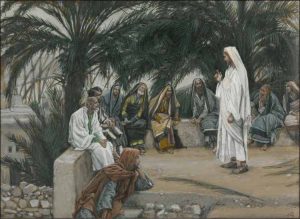In this Sunday’s Gospel, we find Jesus and his disciples traveling in the northern section of Israel, near the Syrian border, at a place known as Caesarea Philippi. This area was known at the time for its worship of many different gods. No wonder Jesus chose this location to ask his followers who people think he is.
Jesus asks: “Who do people say that I am?” (Mark 8:27) His disciples have been with him long enough to begin to understand who Jesus is. They have no doubt heard others speculate regarding his identity.
Some say he is John the Baptist, others Elijah, and still others one of the prophets. (Mark 8:28) Hearing these responses, Jesus gets to the heart of the matter by asking a fundamental question of faith to his disciples: “But who do you say that I am?” (Mark 8:29) This is the question every believer must answer.
St. Peter gives the response, even though he will quickly reveal that he does not yet properly understand the significance of his answer:
“You are the Messiah.” (Mark 8:29)
Hearing this answer, Jesus tells his disciples not to tell anyone. The reason for this is that the disciples must come to understand the true role of the Messiah, which is quite different from the various expectations of the time. Jesus is not another prophet. He is not a political messiah who comes to condemn injustice from a distance. He is not some military messiah who comes with might to free Israel from the Roman dominion. He is the Son of God, who comes to personally enter into the lives of every person, rich or poor, influential or social outcast, respected or sinner. He comes as the Good Shepherd who will lay down his life for the life of the world.
Jesus then begins to instruct his disciples of just what kind of Messiah he truly is: “the Son of Man must suffer greatly and be rejected by the elders, the chief priests, and the scribes, and be killed, and rise after three days.” (Mark 8:31) Now we understand why Jesus told his disciples not to tell anyone he was the Messiah, because this prediction of what lay ahead surely did not fit the ideal image of the present-thinking regarding the Messiah.
St. Peter immediately reveals the conflict in what Jesus preaches with what is hoped for. For this rebuke, Jesus gives a swift and harsh response to Peter: “Get behind me, Satan. You are thinking not as God does, but as human beings do.” (Mark 8:33)
How often today does Satan work in the same way with us, inviting us to think along the lines of human thought? To go along with the crowd and the ‘majority,’ even though we know in our own hearts God’s way is different? Are we able to hear the words of Jesus to Peter when we know we are falling away from morality in the name of political correctness? “Get behind me Satan.”
Just as the way of the Messiah will lead to the cross; to death and resurrection, so it must be for every true disciple of Jesus.
“Whoever wishes to come after me must deny himself, take up his cross, and follow me. For whoever wishes to save his life will lose it, but whoever loses his life for my sake and that of the gospel will save it. What profit is there for one to gain the whole world and forfeit his life? What could one give in exchange for his life? Whoever is ashamed of me and of my words in this faithless and sinful generation, the Son of Man will be ashamed of when he comes in his Father’s glory with the holy angels.” (Mark 8: 34-38)
+pde
0
